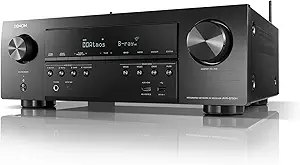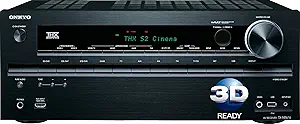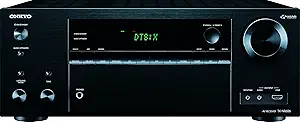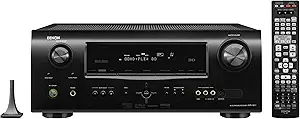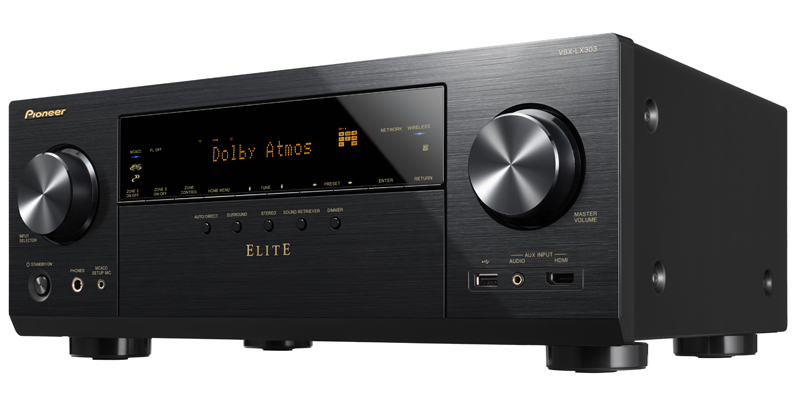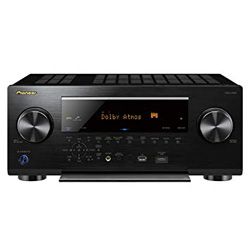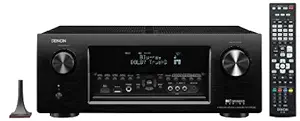Sony STR-DN1080 VS
Pioneer VSX-LX102
Pros & Cons
Sony STR-DN1080
VSPros
- Offers 4K HDR compatibility with HDCP 2.2 support
- Works with Google Home
- Dolby Atmos - sound from above the visual field using additional speakers.
- DTS:X added - being compatible with the newest formats is always a good thing. Sony's first receiver to fully implement this feature.
Cons
- Removed one HDMI output compared to previous models.
- Doesn’t support Apple lossless.
Pioneer VSX-LX102
VSPros
- The user-friendly GUI makes the installing process easy.
- The software is easy to navigate through.
- The mobile application lets you easily access certain functions.
- It is compatible with modern devices, like Apple 4K TV.
Cons
- The mobile application is not well-designed from the usability perspective.
- The surround modes are in a cycle list, which makes you cycle through the list to find the necessary one.
Specifications
Groups
| Specification | Sony STR-DN1080 | Pioneer VSX-LX102 |
|---|---|---|
| Connector Type | ||
| Coaxial Digital Outputs | has not | has not |
| Optical Digital Outputs | has not | has not |
| Hdmi Outputs | 2 | 1 |
| Hdmi Inputs | 6 | 4 |
| Coaxial Digital Inputs | 1 | 1 |
| Phones | 1 | 1 |
| Optical Digital Inputs | 1 | 1 |
| Usb | 1 | 2 |
| Av Inputs | 1 | 2 |
| Subwoofer Outputs | 2 | 2 |
| Radio | ||
| Tuner Bands | AM/FM | AM/FM |
| Tuner Type | digital | digital |
| Preset Station | 30 | 40 |
| Additional Features | ||
| Auto Power Off | ||
| Bi-amplifying | ||
| Audio Return Channel (arc) | ||
| Apple Air-play Support | ||
| Advanced Sound Retriever (asr) Technology | ||
| Three-zone Capability | ||
| Smartphone Remote Control | ||
| A-b Speaker Switch | ||
| Dual-zone Capability | ||
| Pure Direct Mode | ||
| Amplifier | ||
| Total Harmonic Distortion | 0.09 % | 0.08 % |
| Frequency Response | 20 Hz-20 kHz | 20 Hz-20 kHz |
| Output Impedance Per Channel | 6 Ohm | 4 Ohm, 6 Ohm, 8 Ohm |
| Output Power Per Channel | 165 W | 170 W, 80 W |
| Total Output Power | 1155 W | 400 W |
| Clock | ||
| Built-in Clock | ||
| Sleep Timer | ||
| Audio Formats | ||
| Mp3 | ||
| Flac | ||
| Apple Lossless | ||
| Aiff | ||
| Aac | ||
| Wma | ||
| Wav | ||
| Built-in Display | ||
| Type | fluorescent | fluorescent |
| Colour | black | black |
| Signal Processing | ||
| 3d Pass-through | ||
| Video Conversion/scaling | HDMI to HDMI scaling | HDMI to HDMI scaling |
| Hdmi Pass-through | up to 4K | up to 4K |
| Upscaling Via Hdmi | up to 4K | up to 4K |
| Sound Features | ||
| Digital Content Protection | HDCP 2.2 | HDCP 2.2 |
| Surround System Class | 7.2 channel | 7.2 channel |
| Surround Sound Effects | S-FORCE Pro Front Surround Sound | Front Stage Surround Advance |
| Audio D/a Converter | 24bit / 192kHz | 32bit / 384kHz |
| Built-in Decoders | ||
| Dolby True Hd | ||
| Dolby Surround | ||
| Dolby Digital Plus | ||
| Dolby Atmos | ||
| Dts:x | ||
| Media Content Source | ||
| Usb-host | ||
| Network | ||
| Bluetooth | ||
| Connectivity Interfaces | ||
| Ieee 802.3u | ||
| Ieee 802.3 | ||
| Wi-fi | ||
| Bluetooth | ||
| Dimensions | ||
| Dimensions | 19 x 15 x 8.4 inches | 12.6 x 17.1 x 6.8 inches |
| Functions | ||
| Network Audio Player | ||
| Internet Radio | ||
| Digital Player | ||
| Power Device | ||
| Standby Power Consumption | 0.4 W | 0.1 W |
| Operational Power Consumption | 240 W | 480 W |
| General | ||
| Brand | Sony | Pioneer |



